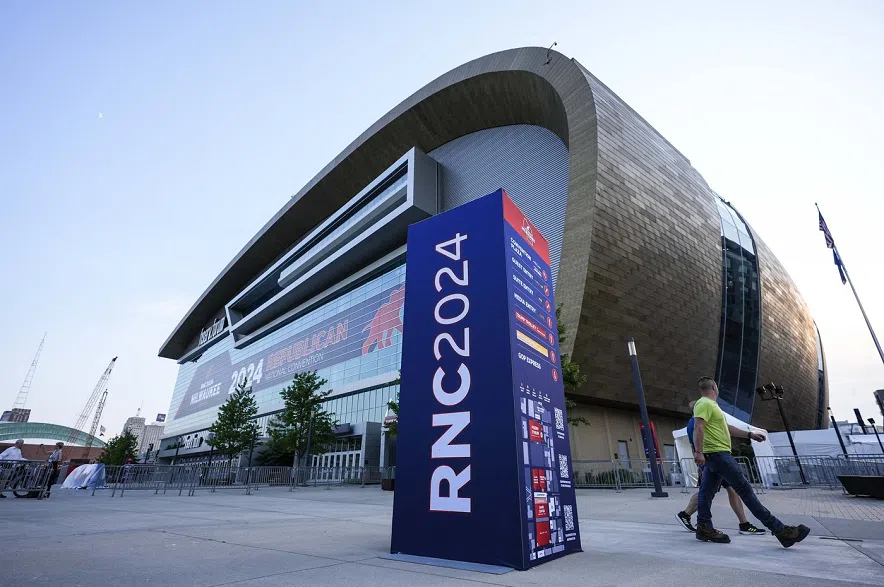Here is a roundup of stories from The Canadian Press designed to bring you up to speed…
Shooting puts focus on convention security
Thousands of Republicans have arrived in Milwaukee as an assassination attempt on former president Donald Trump brings a heightened sense of security to the Republican National Convention this week.
Trump arrived in the city Sunday ahead of the four-day event that was expected to invigorate Republicans as they formally elect him as their 2024 presidential nominee.
Many people arriving at Milwaukee Mitchell International Airport wore bright red hats and shirts with bold text proclaiming well-known Trump slogans, but much of the conversation was about the bloodshed at the rally in Pennsylvania Saturday.
The shooting, which the former president says pierced his ear, killed one supporter and injured two others.
It’s also made the increasing polarization of the political atmosphere top of mind for Americans and put a focus on security at the major Republican event.
Here’s what else we’re watching…
July national carbon rebates expected today
The second instalment of this year’s national carbon price rebate will be deposited or mailed out to millions of households today.
The Canada Carbon Rebate returns 90 per cent of the revenue collected by Ottawa from the consumer carbon levy to households in the eight provinces where it is paid.
British Columbia and Quebec have their own separate but equivalent carbon pricing systems and therefore don’t receive the federal rebates.
The rebate is sent out in four instalments over the year and is based on household size and which province you live in, with a family of four receiving between $190 and $450 today.
Provinces where fossil fuels account for a greater share of electricity have higher carbon rebates because those consumers pay more in carbon pricing.
Today is also the final day for small businesses to file their tax returns to qualify for a new automatic refundable tax credit to offset some of their carbon pricing costs.
LCBO no longer plans to open 32 stores amid strike
Ontario’s main liquor retailer said Sunday it has abandoned plans to open a handful of locations for in-store shopping amid the ongoing strike by thousands of its employees.
The Liquor Control Board of Ontario previously said it planned to open 32 stores three days a week with limited hours if the strike by members of the Ontario Public Service Employees Union went on for longer than two weeks.
LCBO workers represented by OPSEU walked off the job on July 5 after negotiations broke down.
The LCBO says it has been able to serve retail customers since the strike began through online shopping, fulfilling orders within a week.
“Because of this success and because of our confidence in our ability to continue serving retail customers online, we will be re-allocating the personnel that was planned to open LCBO retail stores for in-store shopping to other parts of the operations to further enhance support for bars, restaurants and other businesses,” the organization said in a press release Sunday.
Within hours of the announcement, Restaurants Canada issued a statement saying its members are reassured by word that “limited resources will now be directed towards safeguarding vulnerable businesses.”
Alberta to relax rule on unpaid oilpatch taxes
The Alberta government plans to relax a rule that requires energy companies seeking to buy viable wells from bankruptcy proceedings to first pay all the failed producer’s outstanding taxes.
“I have informed the Alberta Energy Regulator and the Orphan Well Association that my office will be amending the order in a way that will protect the value of productive assets and ensure that they can be acquired by responsible operators,” said Energy Minister Brian Jean in an email.
“We believe that a significant minority of the assets sent to the (association) in the recent past will be found attractive by industry.”
In March 2023, Jean’s office issued an order to the energy regulator requiring it to consider whether an energy company’s tax payments were up-to-date before the company’s licences could be transferred to another owner.
The move was in response to concerns from rural municipalities over growing tax arrears from companies that were struggling or had entered receivership. That unpaid bill totalled $251 million at the end of 2023, which doesn’t include the amount written off.
Canada to deliver apology to nine First Nations
Canada’s Crown-Indigenous Relations minister is scheduled to deliver an apology today to nine First Nations in Manitoba and Saskatchewan following decades of Canada labelling the Dakota and Lakota as refugees.
Gary Anandasangaree’s apology, which will be delivered at a ceremony at Whitecap Dakota Nation south of Saskatoon, is being called “historic” by officials.
By being referred to as refugees, the Dakota and Lakota were not included in treaty negotiations, as Canada viewed them as being American despite their strong presence north of the Canada-U.S. border.
They’ve historically had a more fraught relationship with Canada, including having smaller reserves and fewer economic supports than other Indigenous groups.
Whitecap Dakota Nation signed a self-government agreement with Canada in 2023, which officially recognized them as Aboriginal Peoples under the Constitution.
This report by The Canadian Press was first published July 15, 2024.
The Canadian Press







